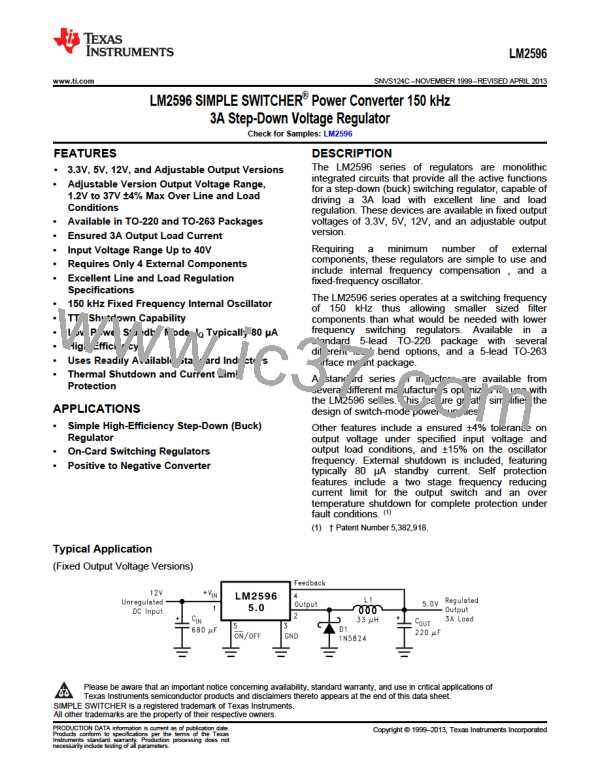LM2596
www.ti.com
SNVS124C –NOVEMBER 1999–REVISED APRIL 2013
Because of their small size and excellent performance, surface mount solid tantalum capacitors are often used
for input bypassing, but several precautions must be observed. A small percentage of solid tantalum capacitors
can short if the inrush current rating is exceeded. This can happen at turn on when the input voltage is suddenly
applied, and of course, higher input voltages produce higher inrush currents. Several capacitor manufacturers do
a 100% surge current testing on their products to minimize this potential problem. If high turn on currents are
expected, it may be necessary to limit this current by adding either some resistance or inductance before the
tantalum capacitor, or select a higher voltage capacitor. As with aluminum electrolytic capacitors, the RMS ripple
current rating must be sized to the load current.
FEEDFORWARD CAPACITOR
(Adjustable Output Voltage Version)
CFF — A Feedforward Capacitor CFF, shown across R2 in Figure 20 is used when the ouput voltage is greater
than 10V or when COUT has a very low ESR. This capacitor adds lead compensation to the feedback loop and
increases the phase margin for better loop stability. For CFF selection, see the Design Procedure section.
Figure 25. RMS Current Ratings for Low ESR Electrolytic Capacitors (Typical)
OUTPUT CAPACITOR
COUT — An output capacitor is required to filter the output and provide regulator loop stability. Low impedance or
low ESR Electrolytic or solid tantalum capacitors designed for switching regulator applications must be used.
When selecting an output capacitor, the important capacitor parameters are; the 100 kHz Equivalent Series
Resistance (ESR), the RMS ripple current rating, voltage rating, and capacitance value. For the output capacitor,
the ESR value is the most important parameter.
The output capacitor requires an ESR value that has an upper and lower limit. For low output ripple voltage, a
low ESR value is needed. This value is determined by the maximum allowable output ripple voltage, typically 1%
to 2% of the output voltage. But if the selected capacitor's ESR is extremely low, there is a possibility of an
unstable feedback loop, resulting in an oscillation at the output. Using the capacitors listed in the tables, or
similar types, will provide design solutions under all conditions.
If very low output ripple voltage (less than 15 mV) is required, refer to the section on OUTPUT VOLTAGE
RIPPLE AND TRANSIENTS for a post ripple filter.
An aluminum electrolytic capacitor's ESR value is related to the capacitance value and its voltage rating. In most
cases, higher voltage electrolytic capacitors have lower ESR values (see Figure 26 ). Often, capacitors with
much higher voltage ratings may be needed to provide the low ESR values required for low output ripple voltage.
The output capacitor for many different switcher designs often can be satisfied with only three or four different
capacitor values and several different voltage ratings. See the quick design component selection tables in
Table 1 and 4 for typical capacitor values, voltage ratings, and manufacturers capacitor types.
Electrolytic capacitors are not recommended for temperatures below −25°C. The ESR rises dramatically at cold
temperatures and typically rises 3X @ −25°C and as much as 10X at −40°C. See curve shown in Figure 27.
Copyright © 1999–2013, Texas Instruments Incorporated
Submit Documentation Feedback
19
Product Folder Links: LM2596

 TI [ TEXAS INSTRUMENTS ]
TI [ TEXAS INSTRUMENTS ]